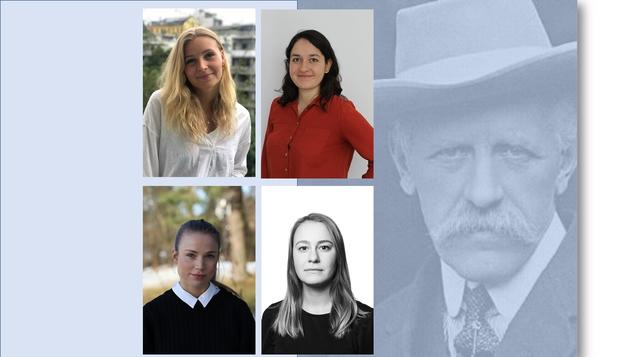New master students at FNI

'Young people often bring fresh perspectives and fresh ideas’, says FNI director Iver B.Neumann. ‘Any organization needs young blood to rejuvenate is, and the FNI is no exception’.
Twice a year FNI admits new master students a financial grant and an opportunity to do their master project in our research environment.
Normally, the students would have an office at Polhøgda and be part of everyday life at the institute, but due to the pandemic, everyone is stuck in their home office.
‘I was a Master’s student here myself, and it certainly was a major career step. So it may prove for all our students. Where the rest of us are concerned, any organization needs young blood to rejuvenate is, and the FNI is no exception. Young people often bring fresh pe![]() rspectives and fresh ideas. They spruce up social life about the place. Not least, some of them fit in so well that they get to stay on in various capacities, or if they leave, they remain part of our network. Again, some of them even come back. That’s why we have offered Master’s scholarships since we became a fully-fledged research institute some four decades ago, and intend to keep on doing so’.
rspectives and fresh ideas. They spruce up social life about the place. Not least, some of them fit in so well that they get to stay on in various capacities, or if they leave, they remain part of our network. Again, some of them even come back. That’s why we have offered Master’s scholarships since we became a fully-fledged research institute some four decades ago, and intend to keep on doing so’.
The four young women who are no temporarily part of the staff are studying political science, human rights, and peace and conflict studies at the University of Oslo. All have projects associated with FNI research.
Selma Lindgren
Master student in Political science, University of Oslo. Supervisor: Jon Hovi
Master thesis: To what extent can differences in affluence explain the differences between EU countries’ progression- and ambition levels for climate cuts and the implementation of climate policy?
– Within the EU, there are large variations in the level of ambition when it comes to climate cuts and the implementation of climate measures. The ambition levels contribute to explaining to what extent the EU member states are willing to do what is necessary to achieve the goal the EU has set in the Paris Agreement. I investigate to what extent affluence can help explain the differences in ambition levels. To examine this, I will conduct a statistical analysis to get an overview of the trends in Europe, and a qualitative analysis, which will delve deeper into the differences between Germany and Poland.
Lorena Schwab De La O
Master student in Human rights at the Faculty of Law, University of Oslo. UiO Supervisor: Peris Jonas
Master thesis: A Climate of Conflict – Conceptualizations of Sustainable Development in a land and environmental conflict and their influence on the struggle for human rights
The indigenous community Unión Hidalgo in Mexico has showed resistance against the construction of wind energy projects by invoking the indigenous rights to land and the environment. Parting from this conflict situation, the purpose of this single-case study is to understand how prevailing conceptualizations of Sustainable Development shape the realities of the affected communities in their struggles for human rights. By conducting a Critical Discourse Analysis, the processes of how global concepts of sustainability travel through different scales and ultimately influence local contexts can be better understood.
Ingeborg Grindheim Slinde
Master student in Political science, University of Oslo. UiO Supervisor: Øyvind Bratberg
In my master theses I explore how science is positioned and considered in political decisions and the public debate on the Norwegian Ice Edge, spring 2020. I conduct a post structural discourse analysis of political- and media documents, aiming at tracing discourses on how science can be related to politics in environmental management questions and further, in our contemporary democracy. My preliminary findings reveal two competing discourses: 1) Politics should be based on science, but politics have space to balance different considerations and interest. 2) Politics should be based on science, with limited room for more considerations.
Sofie Løchen Smedsrud
Master student in Peace and Conflict Studies, University of Oslo. UiO Supervisor: Jens Jungblut
Master thesis: Which factors influence decisions of seed aid in emergency situations? Examining decision-making processes of seed security in Norwegian disaster response in South Sudan.
One of the most common forms of emergency agricultural recovery assistance today is the practice of seed aid. Yet, seed aid is often simplified as a sub-category of food and therefore “invisible” to policymakers. This lack of systematic approach has led to a lack of oversight of seed aid, which in worst case can make emergency-seed interventions do more harm than good. In my thesis, I examine whether and how Norwegian policy for seed assistance corresponds with the FAO's principles for seed safety and whether and how the real seed assistance on the ground corresponds with these general guidelines. Which factors may explain the priorities set in the planning phase of Norwegian-funded projects with regard to seed related interventions?
***
